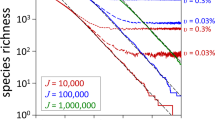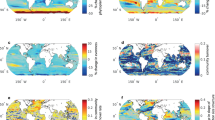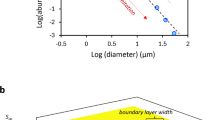Abstract
How can we explain the biodiversity of rainforests and coral reefs if we do not understand the species diversity of phytoplankton in a droplet of water1? In our attempt2 to solve the plankton paradox, we showed that multispecies competition may generate oscillations and chaos and that these fluctuations create opportunities for the coexistence of many species. Lundberg et al. question the novelty of our findings and argue that the plankton paradox was resolved 25 years ago.
This is a preview of subscription content, access via your institution
Access options
Subscribe to this journal
Receive 51 print issues and online access
$199.00 per year
only $3.90 per issue
Buy this article
- Purchase on SpringerLink
- Instant access to the full article PDF.
USD 39.95
Prices may be subject to local taxes which are calculated during checkout
Similar content being viewed by others
References
Hutchinson, G. E. Am. Nat. 95, 137–145 ( 1961).
Huisman, J. & Weissing, F. J. Nature 402, 407–410 (1999).
Koch, A. L. J. Theor. Biol. 44, 387–395 (1974).
Armstrong, R. A. & McGehee, R. J. Theor. Biol. 56, 499–502 ( 1976).
Armstrong, R. A. & McGehee, R. Am. Nat. 115, 151–170 (1980).
Volterra, V. Nature 118, 558–560 ( 1928).
Tilman, D. Resource Competition and Community Structure (Princeton Univ. Press, 1982).
Author information
Authors and Affiliations
Corresponding author
Rights and permissions
About this article
Cite this article
Huisman, J., Weissing, F. reply: Coexistence and resource competition. Nature 407, 694 (2000). https://doi.org/10.1038/35037674
Issue date:
DOI: https://doi.org/10.1038/35037674
This article is cited by
-
Species-based classification reveals spatial processes of phytoplankton meta-communities better than functional group approaches: a case study from three freshwater lake regions in China
Hydrobiologia (2018)
-
Multiple resource limitation: nonequilibrium coexistence of species in a competition model using a synthesizing unit
Theoretical Ecology (2014)
-
Impact of resource availability on species composition and diversity in freshwater nematodes
Oecologia (2005)
-
Bacterial Competition in Activated Sludge: Theoretical Analysis of Varying Solids Retention Times on Diversity
Microbial Ecology (2004)



